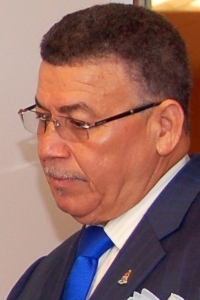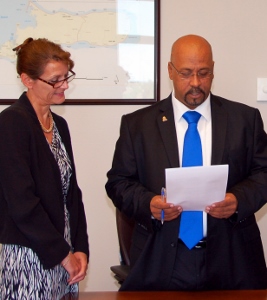Archive for October 10th, 2013
Little Cayman corals bounce back after El Nino
(CNS): A 14 year study of the coral reefs off Little Cayman, which were devastated by the global 1998 El Nino event, found that they have made a complete recovery, despite dire predictions of the complete mortality of corals by 2050, giving hope for coral reef ecosystems everywhere. A paper published this week by the researchers suggests that the island’s isolated setting, stringent protection of a significant portion of the reefs and minimal stress from local human activities were key factors in the reefs’ recovery. Dr Carrie Manfrino, President of the Central Caribbean Marine Institute and one of the authors of the paper, said the researchers involved have speculated that the corals that have rebounded may provide a new, more resilient stock of corals. (Left: Acropora palmata branching coral grows on top of previously dead coral skeleton)
However, while it brings good news, the paper, “A Positive Trajectory for Corals at Little Cayman Island”, published in ‘PLOS One’, also warns that protection of the reefs is critical: “Although any documented recovery of coral is encouraging, it is unlikely that such positive effects will spread throughout the Caribbean unless protection from local stresses is improved. Without such improvements, recovery from natural cataclysms, including those exacerbated by global change, remains unlikely. Ultimately, management of local and global stresses will be required to sustain coral reefs and ensure their capacity to recover from disturbance.”
“The 1998 El Nino event wreaked havoc on reefs in every ocean on earth,” Manfrino explained in a release. “It elevated seawater temperatures and stressed the coral animals to such an extent that they expelled their symbiotic algae and turned bright white (tiny algae live in the coral polyp tissue and provide the color and metabolic resources for corals). This response is called coral bleaching and though corals can recover, many corals died after the 1998 event. The relatively healthy reefs of Little Cayman lost 40% of their corals.” (Right: this sick coral was typical of the reefs in the Caribbean after the 1998 event)
She said this single disturbance was the most extensive and but also the best recorded global mortality on coral reefs in human history. Subsequent debates in the scientific community predicted that the coral would continue to die as a result of global warming and more frequent thermal stress events.
“The complete recovery of the corals at Little Cayman has important similarities with the recovery reported earlier this year for Scott’s Reef in north Western Australia,” Manfrino noted. “The reefs, though thousands of miles apart, are in remote locations with little human impact, a commonality that may help resolve at least one of the debates about the capacity for corals to regenerate and survive.
“Coral recruitment requires a synchronous dispersal of coral gametes that eventually settle to the sea floor, where they plant themselves and begin to grow calcium carbonate skeletons. Successful coral regeneration requires the arrival of coral larvae from nearby undisturbed corals,” Manfrino explained. “It has been previously thought that remoteness make reefs more vulnerable to global disturbances because they are isolated from sources of coral larvae and lack the connectivity required for regeneration. However, at these two distant coral reefs, being remote also means being isolated from local anthropogenic stress. The isolation from humans appears more important than the lack of connectivity.”
Nevertheless, she said that whether reefs could continue to rebound from local and global warming events was unknown. “The work of researchers at Little Cayman will now focus on understanding what factors were most important to this recovery.”
Dr Manfrino, who is also Associate Professor at Kean University, said there have been three additional coral bleaching events since 1998 with no mortality and over the past four years the reefs have been bouncing back.
“Beginning in 2009, we’ve seen a remarkable recovery of all species on just about all reefs surrounding Little Cayman. We speculate that the corals that have rebounded may provide a new, more resilient stock of corals.”
Read more about the Central Caribbean Marine Institute.

Mac conciliatory in reply
 (CNS): Despite the criticisms of him in the premier’s policy statement and things which he described as “not right", the opposition leader made a conciliatory reply to the government’s throne speech and budget address when the House resumed on Thursday. The first to speak in the budget debate, McKeeva Bush said he was giving the government as "wide a berth" as possible and was willing to let some of the things said go as he put them down to the “euphoria of being elected ” to office. The UDP leader said the budget was no surprise and there was even a lot that he agreed with. However, he noted that much of the $100 million surplus would come from fees that his government had implemented.
(CNS): Despite the criticisms of him in the premier’s policy statement and things which he described as “not right", the opposition leader made a conciliatory reply to the government’s throne speech and budget address when the House resumed on Thursday. The first to speak in the budget debate, McKeeva Bush said he was giving the government as "wide a berth" as possible and was willing to let some of the things said go as he put them down to the “euphoria of being elected ” to office. The UDP leader said the budget was no surprise and there was even a lot that he agreed with. However, he noted that much of the $100 million surplus would come from fees that his government had implemented.
Bush said he was not surprised that the campaign promise by the PPM to cut fees had not been met because he knew that the new government would have a hard time bringing the budget as the British Foreign and Commonwealth Office was not going to change.
“They have been like that for a thousand years. They are not going to change, no matter what he said about his new relations with them,” the opposition leader stated, referring to the current premier’s position that things had improved between London and Cayman. “Him and his grinning is not going to change things.”
Bush made much of his position that he was not going to nit-pick and go out of his way to find an opposition view. “We have had enough of that destructive attitude over the last four years,” Bush told his legislative colleagues. “The opposition can’t be the 'same old same old' as it has been,” he said, adding that he intended to ignore the jibes and he hadn’t made it as far as he had in politics without learning something.
“We are one Cayman and we have nowhere to go," he said in the first of several reference to him having just one passport (a Caymanians one), clearly aimed at his fellow West Bay MLA and government minister, Tara Rivers. “We must work to build things up and not to tear them down," he said. “We are here to offer good ideas and not mash down on whatever is being attempted. My purpose here is to work. I am a worker and if I can’t be given a chance to help, I won’t be a hindrance,” Bush added.
The opposition leader said that when the debate was concluded and legislators made it to Finance Committee, he would be asking about some things he had seen in the budget that need explaining but otherwise he was not going to make extensive criticisms, as he acknowledged some savings made by the government in the spending plan.
However, Bush emphasised his view that Cayman cannot survive unless it has outside investment and that would not come without getting outside people and the infrastructure projects off the ground.
“Our people must have jobs now. The country needs the projects because that’s the jobs. That is what we are elected to do — get business done so our people can maintain a good standard of living or we will become the crime capital of world. And we all know that and we all agree we need to stop that.”
He said that no matter how many people the police capture, they had to stop the crime happening in the first place.
Bush said he was not there "to crucify anyone or be spiteful" because there had been enough spite with Duncan Taylor, the former governor. Bush said that this "would be proven" as he went on to imply that the public purse had spent money on cars to take "his dog to the vet" but that wasn’t seen as abuse, and suggested that there was one rule for the governor and one for everyone else.
The opposition leader also lamented the lack of financing for MLAs' constituency work. He said that most elected members spent significant amounts of their salaries on constituents' needs, and noted that now they had to finance their own offices, as he made a bid to get his phone costs covered, saying that was how representatives kept in touch with the people that were elected to serve. He said government was paying for iPads but couldn’t help with the phone bills.
Looking back over his own time in office, he said that his government had accomplished much. While he didn’t do everything he wanted, he believed he had a solid list of achievements as they had kept the country afloat, even if nobody wanted to acknowledge that fact. From getting Cayman off the OECD Grey List and retaining the country’s credit rating, to the road side clean ups and tourism success, Bush listed what he felt were the positives from his time at the helm between May 2009 and December 2012.
Talking about the future and the very topical issue of unemployment, he suggested government hold a national personnel symposium to let everyone talk and air the issues relating to local employment and employers, and the creation of an accreditation system for good employers. He called for capacity building and retooling of local people to transform Caymanian workers to be best in world and ensure the competitiveness of the economy. Bush said the country had to build a better work ethic and life skills training for young people to generate passion for excellence.
As he wound up his response to the throne speech, he once again emphasised his single Caymanian passport, adding that he had “nowhere to run to”. Cayman, he said, could not afford four more years of fussing and fighting, as he referred to the opening of his presentation when he quoted from the Ernie Smith song.
Closing his response to the government, Bush continued to be conciliatory. “The government has announced some things I am in tune with and that I support … My purpose is to work and I will do my part to help.”

Rally going ahead as LA sits
 (CNS): The member for North Side has confirmed that he will be taking part and speaking at the planned demonstration against the government’s proposed immigration bill Friday. Although there were some indications that the protest march, due to start at the government building at 10am on 11 October, was to be cancelled. the rally, Ezzard Miller said, was very much alive. While some original members of the organising committee have been mollified by government’s comments on the proposed immigration changes after they met directly with the premier, the independent member said many, many more people still considered the bill as “genocide for Caymanian employment”.
(CNS): The member for North Side has confirmed that he will be taking part and speaking at the planned demonstration against the government’s proposed immigration bill Friday. Although there were some indications that the protest march, due to start at the government building at 10am on 11 October, was to be cancelled. the rally, Ezzard Miller said, was very much alive. While some original members of the organising committee have been mollified by government’s comments on the proposed immigration changes after they met directly with the premier, the independent member said many, many more people still considered the bill as “genocide for Caymanian employment”.
Miller said there were significant issues and major problems for local workers with the bill, which would reinforce the glass ceiling, and he hoped government would listen to those opposed to the proposed legislation before it was too late. He told CNS that the country should not be placed in the position of dealing with something as though it were a national crisis when it was a result of poor planning by disorganised employers.
“They have known about this for two years. We should not be forced to rush through such important legislation because of their bad management,” he added.
Speaking in the Legislative Assembly on Thursday afternoon, Miller said that the rising crime in Cayman could not be separated from the growing problems of unemployment and the marginalization of Caymanians.
“Young people have lost hope in the system as hard work and determination are no longer rewarded and they are turning to crime,” he said. Yet despite these problems the first thing that the new government want to do was to regularize the position of some 1500 expatriate workers and allow them all to apply for permanent residency, he went on to state.
The North Side member said he was still hoping that the government “would have a Saul on the road to Damascus moment” and withdraw the bill to give much more time for careful consideration of the process of reform.
He said there was still time to backtrack but he did not hold out much hope as he believed that the rush to make the changes had to be coming at the request of someone with significant influence. “I can’t believe government is doing this of its own violation, somebody is pressuring somebody,” Miller said.
The protest rally, which is set to start outside the Government building on Elgin Avenue at 10am will see those involved march down to the Legislative Assembly, where the crowds are expected to gather as lunch time approaches and where a few short speeches will be made about the opposition to the legislation before demonstrators will march back to the government building by 2pm. The demonstration will now take place against the backdrop of the budget debate, which will be continuing in the Legislative Assembly.
Prior to the protest, government is hosting a second town hall meeting this evening (Thursday 11 October 7-30pm) in George Town at the Elmslie Memorial Church, where officials will deliver a presentation and take questions regarding the proposed bill, which is expected to be debated in the LA during this budget session following the completion of Finance Committee later this month.

Bernie Bush sworn as opposition LA deputy leader
 (CNS): As provided for in the Cayman Islands 2009 Constitution, Bernie Bush, the third elected member for West Bay, has been appointed the Deputy Leader of the Opposition in the Legislative Assembly. While he is the second in command spot in the LA among the three United DemocraticParty members, Bush is not the UDP deputy, as local businessman Renard Moxam, who failed to win a seat in the George Town election battle, has been given that role. Bernie Bush was sworn in by Governor Helen Kilpatrick at her office in the Government Administration Building on Wednesday, 9 October.
(CNS): As provided for in the Cayman Islands 2009 Constitution, Bernie Bush, the third elected member for West Bay, has been appointed the Deputy Leader of the Opposition in the Legislative Assembly. While he is the second in command spot in the LA among the three United DemocraticParty members, Bush is not the UDP deputy, as local businessman Renard Moxam, who failed to win a seat in the George Town election battle, has been given that role. Bernie Bush was sworn in by Governor Helen Kilpatrick at her office in the Government Administration Building on Wednesday, 9 October.
As Bernie Bush took the oath of allegiance, veteran politician and opposition leader, McKeeva Bush, was present to see his legislative and party colleague sworn in as his back-up in the parliament.
Although the United Democratic Party is the official opposition, it has only three members in the House and is flanked by the two independent members from East End and North Side. The opposition sits across from a full government bench after the three Coalition for Cayman members opted to join the PPM administration after the Progressives won the largest number of seats. In addition, following the election results, Juliana O’Connor-Connolly, who left the UDP to join the PNA, crossed the floor to join the PPM and took up the speaker’s post, giving the party a significant majority.

Diplomat bitten by graft charges over pineapple tarts
 (Reuters): First it was sex, then casinos. Now, a Singapore diplomat has been charged with inflating the number of pineapple tarts and bottles of wine carried on official visits in the latest corruption case to hit the squeaky clean city-state. Lim Cheng Hoe, former chief of protocol at the Ministry of Foreign Affairs, allegedly overbilled authorities by around $71,100 by overstating the amount of gifts bought for official purposes between 2008 and 2012. Lim faces 60 charges and could be jailed for up to three years on each charge if found guilty. Pineapple tarts are bite-sized snacks popular in many Asian countries. The versions favored in Singapore are open-faced buttery pastries topped with sweet pineapple jam.
(Reuters): First it was sex, then casinos. Now, a Singapore diplomat has been charged with inflating the number of pineapple tarts and bottles of wine carried on official visits in the latest corruption case to hit the squeaky clean city-state. Lim Cheng Hoe, former chief of protocol at the Ministry of Foreign Affairs, allegedly overbilled authorities by around $71,100 by overstating the amount of gifts bought for official purposes between 2008 and 2012. Lim faces 60 charges and could be jailed for up to three years on each charge if found guilty. Pineapple tarts are bite-sized snacks popular in many Asian countries. The versions favored in Singapore are open-faced buttery pastries topped with sweet pineapple jam.

World Mental Health Day
Each year, as we celebrate World Mental Health Day in the Cayman Islands, we are reminded of shocking numbers produced by the Pan American Health Organisation (PAHO). On average mental disorders account for some 24% of diseases in our region. Of these, depression is by far the most prevalent.
Many still perceive mental health issues to be on the border of health care, particularly since they feel that the numbers involved are limited to only a small percentage of the total population. Yet the PAHO findings should dispel that myth and at the same time serve as a wake up call to make mental healthcare more accessible to everyone.
This year’s theme: Mental Health and Older Adults could not have been more appropriate as we also celebrate our seniors throughout this month. The contribution that these persons have already made to our society highlights the value to them, and to us, of ensuring that as they age their minds are agile and able to work towards the betterment of this country and its people.
More than ever before, mental well-being is vital to persons of all ages. Just as we guard our physical health, we must also be mindful of our mental health—and that of other people.
I commend our local mental health practitioners who are already working towards integrating mental and physical treatments, to the benefit of all patients.
Yet there are no quick fixes, and mental illness will continue to be a challenge for individuals, society and government.
The truth is that for too long, the associated stigma and stereotyping has seriously undermined effective management and recovery for persons living with this illness. This has even led to deficiencies in treatment.
The newly appointed Mental Health Taskforce is made up of educators, psychologists, social workers, nurses, police and physicians, along with other partnering individuals and agencies. With the help of public education – and by extension community participation– it will work towards a Cayman Islands that enjoys increased physical and mental health.
Even as health officials and others work towards introducing dynamic solutions, members of the public too can help to curb the negative impact of mental illness. Whether you help a friend get through depression, start a conversation with an older person or just take some quiet time for yourself, make mental health your business. In the year ahead, the benefits you reap in terms of your well-being and that of the wider community will be immeasurable.

200 locals targeted for tourism jobs
 (CNS Business): The government, the private sector tourism body and local recruitment agencies have all teamed up in order to help find jobs for around two hundred local people who have expressed an interest in working in tourism. The employment ministry and the Cayman Islands Tourism Association have begun an employment drive to find jobs for Caymanians registered with the National Workforce Development Agency in Cayman’s second major industry before the start of the high season using what is being described as a systematic and transparent process. The programme will also help define essential training needs and recommend specific action plans to help ensure applicants are equipped to meet the industry’s needs. Read more on CNS Business
(CNS Business): The government, the private sector tourism body and local recruitment agencies have all teamed up in order to help find jobs for around two hundred local people who have expressed an interest in working in tourism. The employment ministry and the Cayman Islands Tourism Association have begun an employment drive to find jobs for Caymanians registered with the National Workforce Development Agency in Cayman’s second major industry before the start of the high season using what is being described as a systematic and transparent process. The programme will also help define essential training needs and recommend specific action plans to help ensure applicants are equipped to meet the industry’s needs. Read more on CNS Business